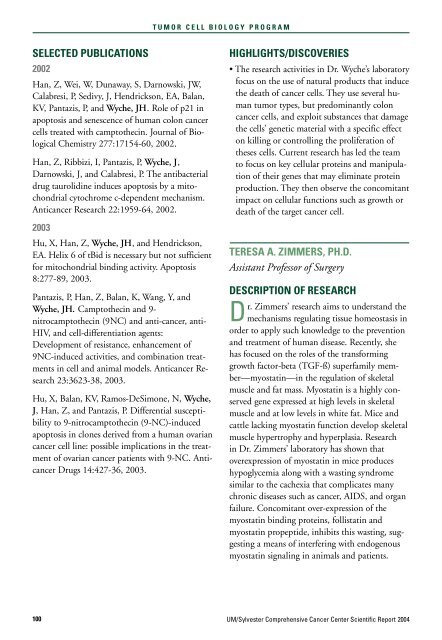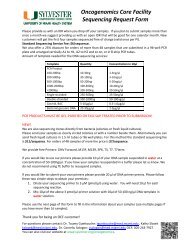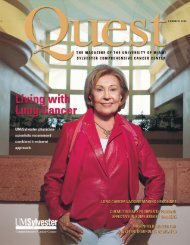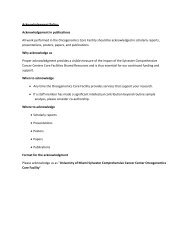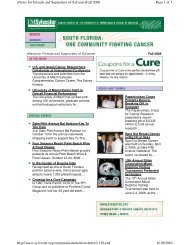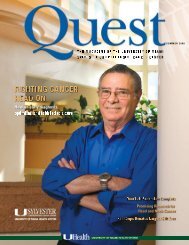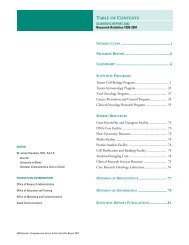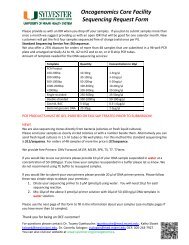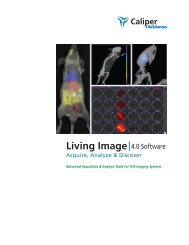SCIENTIFIC REPORT 2004 - Sylvester Comprehensive Cancer Center
SCIENTIFIC REPORT 2004 - Sylvester Comprehensive Cancer Center
SCIENTIFIC REPORT 2004 - Sylvester Comprehensive Cancer Center
Create successful ePaper yourself
Turn your PDF publications into a flip-book with our unique Google optimized e-Paper software.
T U M O R C E L L B I O L O G Y P R O G R A M<br />
SELECTED PUBLICATIONS<br />
2002<br />
Han, Z, Wei, W, Dunaway, S, Darnowski, JW,<br />
Calabresi, P, Sedivy, J, Hendrickson, EA, Balan,<br />
KV, Pantazis, P, and Wyche, JH. Role of p21 in<br />
apoptosis and senescence of human colon cancer<br />
cells treated with camptothecin. Journal of Biological<br />
Chemistry 277:17154-60, 2002.<br />
Han, Z, Ribbizi, I, Pantazis, P, Wyche, J,<br />
Darnowski, J, and Calabresi, P. The antibacterial<br />
drug taurolidine induces apoptosis by a mitochondrial<br />
cytochrome c-dependent mechanism.<br />
Anticancer Research 22:1959-64, 2002.<br />
2003<br />
Hu, X, Han, Z, Wyche, JH, and Hendrickson,<br />
EA. Helix 6 of tBid is necessary but not sufficient<br />
for mitochondrial binding activity. Apoptosis<br />
8:277-89, 2003.<br />
Pantazis, P, Han, Z, Balan, K, Wang, Y, and<br />
Wyche, JH. Camptothecin and 9-<br />
nitrocamptothecin (9NC) and anti-cancer, anti-<br />
HIV, and cell-differentiation agents:<br />
Development of resistance, enhancement of<br />
9NC-induced activities, and combination treatments<br />
in cell and animal models. Anticancer Research<br />
23:3623-38, 2003.<br />
Hu, X, Balan, KV, Ramos-DeSimone, N, Wyche,<br />
J, Han, Z, and Pantazis, P. Differential susceptibility<br />
to 9-nitrocamptothecin (9-NC)-induced<br />
apoptosis in clones derived from a human ovarian<br />
cancer cell line: possible implications in the treatment<br />
of ovarian cancer patients with 9-NC. Anticancer<br />
Drugs 14:427-36, 2003.<br />
HIGHLIGHTS/DISCOVERIES<br />
• The research activities in Dr. Wyche’s laboratory<br />
focus on the use of natural products that induce<br />
the death of cancer cells. They use several human<br />
tumor types, but predominantly colon<br />
cancer cells, and exploit substances that damage<br />
the cells’ genetic material with a specific effect<br />
on killing or controlling the proliferation of<br />
theses cells. Current research has led the team<br />
to focus on key cellular proteins and manipulation<br />
of their genes that may eliminate protein<br />
production. They then observe the concomitant<br />
impact on cellular functions such as growth or<br />
death of the target cancer cell.<br />
TERESA A. ZIMMERS, PH.D.<br />
Assistant Professor of Surgery<br />
DESCRIPTION OF RESEARCH<br />
Dr. Zimmers’ research aims to understand the<br />
mechanisms regulating tissue homeostasis in<br />
order to apply such knowledge to the prevention<br />
and treatment of human disease. Recently, she<br />
has focused on the roles of the transforming<br />
growth factor-beta (TGF-ß) superfamily member—myostatin—in<br />
the regulation of skeletal<br />
muscle and fat mass. Myostatin is a highly conserved<br />
gene expressed at high levels in skeletal<br />
muscle and at low levels in white fat. Mice and<br />
cattle lacking myostatin function develop skeletal<br />
muscle hypertrophy and hyperplasia. Research<br />
in Dr. Zimmers’ laboratory has shown that<br />
overexpression of myostatin in mice produces<br />
hypoglycemia along with a wasting syndrome<br />
similar to the cachexia that complicates many<br />
chronic diseases such as cancer, AIDS, and organ<br />
failure. Concomitant over-expression of the<br />
myostatin binding proteins, follistatin and<br />
myostatin propeptide, inhibits this wasting, suggesting<br />
a means of interfering with endogenous<br />
myostatin signaling in animals and patients.<br />
100<br />
UM/<strong>Sylvester</strong> <strong>Comprehensive</strong> <strong>Cancer</strong> <strong>Center</strong> Scientific Report <strong>2004</strong>


